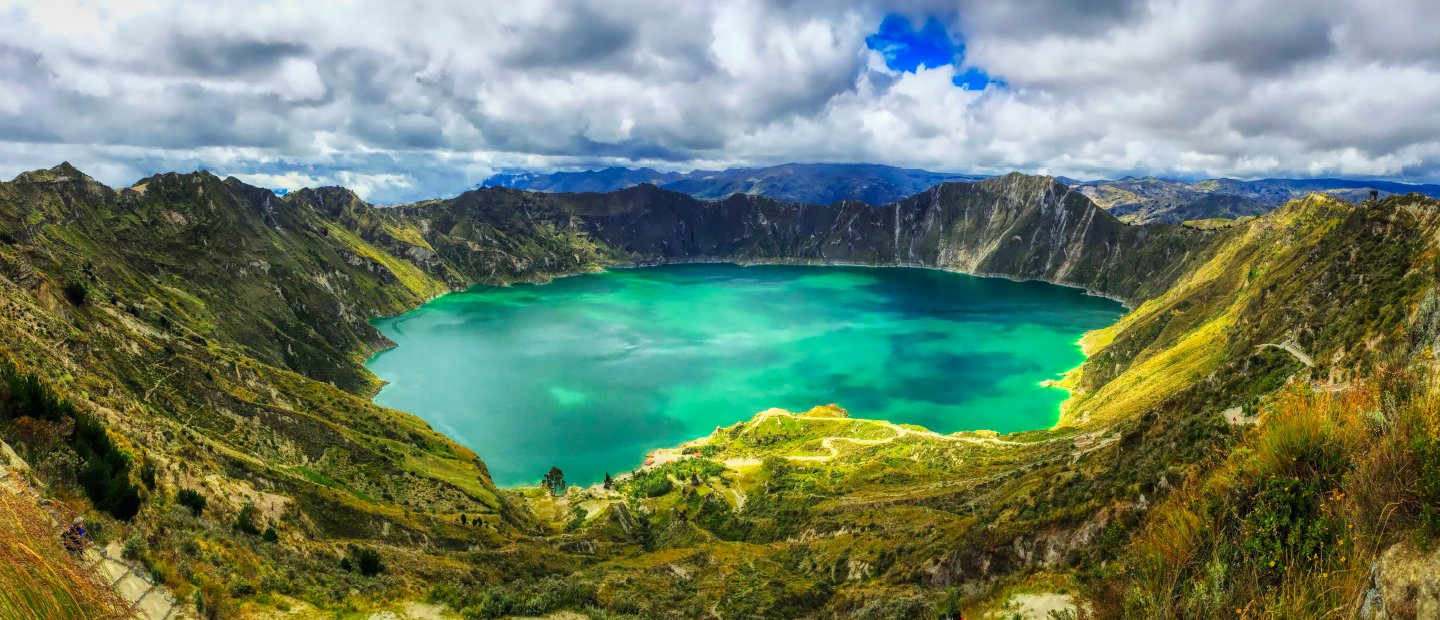
Tropical Field Ecology in Ecuador
Oakland University's 10-day faculty-led program in Ecuador. Students will experience a field-based introduction to tropical ecology with an emphasis on tropical ecosystems and biodiversity. The course will be conducted in Ecuador where alpine glaciers, cloud forests, rainforests and the riverine ecosystems of the upper Amazon basin are readily accessible. From piloting wooden boats through the rainforest to hiking on the rapidly disappearing Antisana glacier, students will have an unforgettable experience in the incredibly varied ecosystems of South America.
Course: BIO 3333: Tropical Field Ecology (3 credits)
Program Dates: December 13-23, 2025
Application Deadline: September 19, 2025
For more information contact:
Scott Tiegs, Professor, Biology
[email protected]
(248) 370-2695
Students fly together to Quito, Ecuador's capital, sits high in the Andean foothills at an altitude of 9350 feet.
Students travel 10 days during winter break to different Ecuadorian ecosystems including alpine grasslands, glacial streams, rainforests, cloud forests, sandy intertidal, rivers and riparian forests. We will have a dedicated bus for the trip, as well as an interpretive Ecuadorian guide.
Students take a cable car to Pichincha. By bus students will arrive at 18,000 feet glacial Antisana. The journey continues to Amazonia, Bellavista, Machalilla, and outbound from Guayaquil.
Following the program, students return to Michigan from Ecuador.
Requirements: A minimum GPA of 3.0 is required. Students who don't meet the GPA requirement may still be eligible and should speak with OU's International Education Office prior to applying.
Course: BIO 3333: Tropical Field Ecology (3 credits)
Participants will be undergraduates from the Departments of Biology, and Chemistry (especially those from the Environmental Science Program). Priority will be given to students who have taken BIO 3330.
The course is taught in English by OU faculty.
Learning outcomes include
- Appreciation for the biodiversity in tropical ecosystems
- Recognition and identification of important tropical plant and animal taxa
- Increased knowledge of the biology and ecology of tropical organisms
- Better understanding of ecological connections between organisms and their habitat
- Holistic view of species interactions in the tropical communities, including mutualisms, commensalisms, parasitism, and predator/prey relationships etc.
- Awareness of distinct tropical habitats and the physical and biological factors affecting the distribution of organisms
- Recognize evolutionary behavioral strategies and morphological adaptations among tropical organisms
- Familiarization with food webs and energy flow in tropical ecosystems
Students will stay in hotels, biological preserves and hostels while in Ecuador in different regions of the country.
All meals are included in the program cost. Popular Ecuadoran specialties include ceviche, seafood prepared in lemon juice; lechón, suckling pig; and cuy, whole roasted guinea pig-however, some delicacies may only be for the most adventurous stomachs! No matter where you go, rice is a staple part of the diet, and soups and stews are very popular.
Tuition: 3 Credits
You will be charged for these credits on your eBill at your normal rate of tuition.
Program Fee: $3,700
To be paid to OU on our MarketPlace payment system and includes: airfare, housing and all meals, ground transportation and all excursions while in Ecuador, and health insurance.
Additional Costs: $375
You will need additional funds for these expenses not covered by program fee. Amounts are estimated.
Incidental personal expenses: $200
Passport (if you don't have one): $175
Scholarships and Financial Aid: You are able to use financial aid to cover your full cost of attendance to this program (tuition, program fee and additional costs). Scholarships are also available through your study abroad application.
International Education
586 Pioneer Drive
Rochester, MI 48309-4482
(location map)
(248) 370-2889
[email protected]







